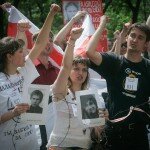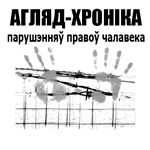
Many talented young Belarusians, not only social activists, just people talented in their areas of interest, including journalists; go abroad to get away from the Belarusian dreariness and find professional fulfillment. Some emigrate temporary, some permanently. Belaruspartisan.org raised the issue of self-realization under the dictatorship in an interview with a well-known journalist, persecuted by the authorities for his criticism of Lukashenko’s regime, Andrzej Poczobut.
– How would you comment situation of mass “escape” of young people out of the country?
– It’s always a loss for a country, when young talented people emigrate. The current government has set a number of barriers, not so much political as psychological. The atmosphere in the country is suffocating, there is a dictatorship of mediocrity. Take any area of reality, journalism, business. Everywhere there is appreciated not whether a person is able to achieve some results, be professional, but rather obedience is highly valued. The selection is different than anywhere else – successful people in Belarus are those who in a normal country, in conditions of normal competition never would have achieved success. An example are the state journalists and “stars” who got a job in the state controlled media. This is true not about all working there, but most.
When one confronts a similar phenomenon is faced with a choice: fight, adapt or leave. Some choose the third option. It is difficult to blame anyone, in the end we have only one life, not everyone wants to waste it to fight windmills. Especially if one knows that 40 kilometers west, such problems are not as common as here. This is completely normal. I believe that if normality again has established itself in Belarus, then many of those who left would return. Their experience would be a new intellectual capital of Belarus.
– Do you think that they would actually come back? It is said that one gets used to good things quickly, and the return to Belarus means building it from scratch.
– I think they would come back. For example I can give Poland. When, after 1989, the political situation changed, and Poland became a democratic country, that is to say, the country returned to normalcy – the number of young people who have managed to make a career abroad came back. Of course, not all, some remained abroad. A good example of such a return is Radoslaw Sikorski. He emigrated, made a career as a correspondent, then returned to Poland and made a career as a politician. Today he is the minister of foreign affairs. I think that many of those who left Belarus for political reasons, would like to return to the country.
– You can at any time go to Poland, why you do not do this?
– I was born here, this is where my ancestors are buried, where could I go from here? I do not even want to leave. I just did not see reasons to do so. Even regardless of the criminal case, which was opened against me. If I wanted I could have left some time ago. When I was threatened with spending a few years in prison, an opportunity to do so has become even more justified. But then I thought that the sentence will end sooner or later , and there is no point in leaving country and completely rebuilding my life. That’s why I remained in Belarus. I am part of “the local” Belarusian landscape. In the Grodno district, you may even find Poczobuty village. So I am bound geographically, historically and morally to the land, and here I feel at home. It is very important to me.
– Political prisoners today consist mainly of young people under the age of 31 Recent high-profile case, is a case of Andrej Hajdukou – 1.5 years in penal colony. Do you think that such a situation is a sign that the government is afraid of the younger generation of Belarusians?
– I would not divide across the generational lines. Although when you consider the fact that a country is ruled by pensioners, almost all the important public functions are run by people in retirement age. And that Belarusian elite is ageing together with Alexander Lukashenko, it is possible to create a theory of conflict of generations. In fact, the conflict is not based on the generation gap, because it is conflict between the authorities and people having their own opinion and not fearing to express it. To control the society one has to keep it in fear, which the authority exercises – they arrests activists and initiate criminal proceedings against them. The purpose of such methods is not only to punish and neutralize specific people, but also to intimidate all the others by organizing a show trial.
There is another issue. The Lukashenko regime is not using particularly cruel methods, as compared to other dictatorships, they generally belong to a relatively lenient. This is not Chile, he is not Pinochet, we do not have in Belarus mass shootings. However, it was possible to fairly quickly intimidate the society. It does not merit Lukashenko, it is rather a question of Belarusian society. In Belarus, few individual repressions were enough to intimidate the nation.
Still, I observe the situation in the country and I am optimistic, because I think, the top of the rule of Lukashenko’s regime is already behind us, now everything is going downhill. Power is heavily degraded, so changes await us sooner or later.
I will give here an example of the February events in Russia. The revolutionary events surprised the two centers, which by definition should be informed in the first place: the Russian Secret Service and revolutionaries. Theoretically, these centers orient themselves best in a situation, but in the end both are not prepared. Something like this can happen in Belarus, so the authorities react nervously to any sign of freedom, even if it does not pose an overt threat. The local situation may lead to tectonic movements in society and destabilize the situation – and that is what the authorities are afraid of.
– Do you think that only a revolution can change the country?
– Lukashenko as a politician survived perestroika, when the authoritarian regime was subject to internal transformations, which led to its collapse. Lukashenko has this syndrome of a perestroika politician and fears of a repetition of the situation from the 90’s, when the reforms led to the collapse of the authorities. So I do not count on perestroika again. Neither for perestroika, or other changes. This means that the only solution is palace coup or revolution. Not necessarily in the violent form. I do not believe in reform, about which so much is talked about.
– What can do young and talented people who do not like the current situation – should they protest, risk to make a difference, or just give up, and adapt to the circumstances?
– Everyone decides for himself/herself and estimates what is most important to one. The most important thing is to evaluate ones strength. It is not good when one is imprisoned and there realize that he or she is not ready for this experience. Attempts to change the situation in this way can destroy the life of man, and the man himself. Therefore, the most important is to know your own strengths and know what you want.
The authorities are rather strict. This is due to the way it is organized: Lukashenko meets officials at the meeting, and then he starts to criticize them and give orders. Those are shaking, make notes, and all is broadcasted by television. This means that these officials are humiliated to extremes. After that, the officials are returning to their jobs, and begin to convene meetings and bully their subordinates. And the people are sitting in front of the screen and use the entertainment – funny as it is!
This wave arrives later to the individual worker who gets reprimand from a director who got earlier reprimand from the governor, etc. When it comes to ordinary people, they do not like it anymore. People in public positions of power are afraid and that is why they can be wicked. If they are broken, they are ready to break the other.
– On your Facebook page, in a comment under the photo that won the contest Belarus Press Photo 2013, you wrote that the prison is filled with emotion. What do you mean by that?
– Yes indeed it is! Man goes there often being under extreme stress. Plucked out from normal life, daily routine. First one is sent to detention center where there is still a hope for a change in qualification of crime. Then it turns out that it does not happen. One goes to prison, and there begins for him/her a completely different life. Regardless of whether he/she is a official or a businessman. One had a certain status in the society, was respected and now goes to the position of being a nobody. One needs to build his/her authority from scratch. For some it’s a really tough experience, especially when, until recently, they were in power, they felt that they are important.
In the detention center it is decided about fate of imprisoned person, whether he will go to jail and for how long. A man must choose how to behave, to find a way out of the situation. I was in a one cell with a man who was punished for being a head of an organized group only because he did not want to betray anyone. He refused to denunciate and got a big verdict. Although the authorities told him directly – if you speak, the sentence will be shortened. And if you are so proud serve the whole sentence. On the other hand, each sentence ends, the person will be released and will not have to be afraid of anyone. Those, however, who seek shortcuts in similar situations, first of all feel fear after the release.
– What did you personally learn from prison experience?
– Previously I did not wear a wristwatch. After prison, I bought one, because when one is arrested, they always take the cell phone but allow to have watch. A watch helps you feel better.
I’m already at that age, that it’s hard to change me and have any effect on me. I’m 40 years old, what can radical change in my life? Mentally, I was prepared to incarceration. I was, of course, under the stress, it was hard, but not so much as to change me cardinally. I know people who were imprisoned under Stalin’s rule, they underwent harsh investigation and torture. Compared with them, it was mere walk, kind of the extreme tourism.
– In September ends suspension of your sentence. There will be another lawsuit decisive about your fate.How do you think, what will be the decision?
– If this was a normal case under criminal law, I have no questions – adjournment passes, the matter will be depreciated. But this is not a normal thing, but a political one. This suspension between the cell and freedom has been going on for two years. I got used to it. I had forgotten what it’s like to go somewhere freely. The feeling of being under control became natural. I’m used to it. Back in 2005 when the authorities initiated a criminal case against me. The investigation lasted two days, I had a limited right to leave the place of residence, and a ban on leaving the country. Then I was not punished. But I do not know what will happen this time.
– In view of the above, the support of relatives, friends and colleagues have to be very important?
– Of course. I think it’s harder to political prisoners who are not journalists. Politicians, I do not know why, do not show solidarity with each other. Perhaps this is due to the fact that they percept each other as rivals. Journalists on the other hand have a strong instinct of professional solidarity. Thanks to it, if one of them is in trouble, the media describe the situation extensively. When you read about it in newspapers, on the internet, the politicians start to react. My case is an example. So I thank my colleagues for their solidarity.
belaruspartisan.org
Translation by Palitviazni.info






 Belarusian
Belarusian English
English Русский
Русский polski
polski









